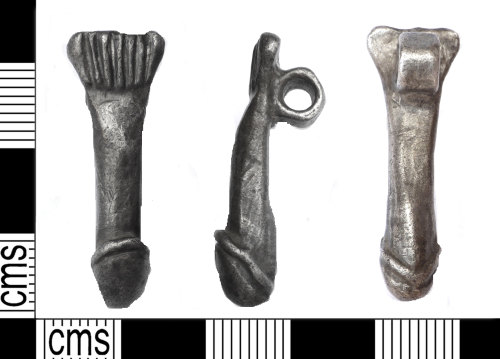Pěkný a unikátní šulínek 
A i když ochablý, paní je stejně šťastná 

A detective found a flaccid Roman phallus without testicles in the form of a pendant
Categories: Nálezy nejenom s detektorem ve Velké Británii a Irsku
This New Year's Eve in Higham, Kent, detectorist Wendy Thompson discovered a 1,800-year-old silver pendant of unusual design. It is the only pendant of its kind in the PAS database and experts define it as an item of national significance. It has now been declared a treasure.
Penile pendants were used by the Romans as amulets to ward off evil curses and afflictions. They were particularly popular accessories for children and soldiers. Most such pendants are made of copper alloy, not precious metals. This one's made of silver, and it's missing testicles. The amulet weighs 9.7 grams, is 30.94 mm long, 12.28 mm wide and 9.3 mm thick including the loop for hanging. The upper part is triangular with engraved lines, which are probably meant to represent pubic hair.
According to the description of the amulet in the Portable Antiquities Scheme database, the presence of pubic hair and the absence of testicles may suggest that this phallus may have had a very different connotation to typical and otherwise commonly understood pendants of the past. The main group of phallic objects with pubic hair were the Flaccid pendants. It is likely that this pendant depicts a flaccid macrophallus, which rather than protecting against evil, symbolizes a lack of control and an almost barbaric sexuality.
Its peculiar features were detailed at the inquest, which was held at County Hall in Maidstone last Thursday. In his report, Coroner Roger Hatch described the object in great detail, particularly its "foreskin, shank and pubis". The report states that it was difficult to narrow down the exact date of the pendant, but that its phallic nature points to the Roman era in Britain. "It is the first silver object of this nature. It is a find of national significance".
The pendant meets the criteria for treasure classification as it was made before 1721 and is made up of more than 10% precious metals. It will now be assessed by an appraisal committee to determine its fair market value. The object will then be offered to a local museum if it is able to purchase it for a set amount. This will be split between the finder and the landowner.
Roman Němec
Sources: livescience.org, thehistoryblog.com, finds.org.uk


Wendy Thompson
The article is included in categories:
- Archive of articles > Archaeology > Finds and rescue research abroad > Nálezy nejenom s detektorem ve Velké Británii a Irsku
Post
Znám klučinu, který má dva nalezené v ČR. Bohužel, ještě se mi ho nepodařilo zlomit, aby to vypublikoval. Ale nevzdávám se, teď jsem mu poslal odkaz na článek, zda není už čas :)
Paní vypadá opravdu šťastně 


Ano, nálezkyně měla velkou radost. Někdy i 3 cm umí potěšit... 
Kamarád mi k přívěsku napsal: Myslíš, že ho majitel cucal, když se nudil?
Vůbec bych se nedivil, kdyby k tomu býval i zvedací mechanismus. 
Falická symbolika je stará jako lidstvo samo. Lidi to vždy fascinovalo a pořád to trvá. Jenom to tvrzení, že ty ochlupené měli sloužit jako ochrana před zlem se mi nějak nezdá 
Neboj, my to pochopili. 
Neděláš vrátnýho v harému? 


V harému by jsi akorát koukal, jak picá nějaký paša  Protože nikdo jiný tam nepical. Proto tam přece pracovali eunuši
Protože nikdo jiný tam nepical. Proto tam přece pracovali eunuši  . A to by jsi asi nechtěl kolego. Nebo ano?
. A to by jsi asi nechtěl kolego. Nebo ano? 


Tož to potom jo 👍 
Pánové! I malý šašek dokáže zahrát velké divadlo. 
Prý to jde, kdysi dávno se o tom zmiňoval v jednom rozhovoru Jiří Straka v přítomnosti jeho současné (možná ještě živé) přítelkyně. A ten je jisto jistě nemá. Budeme mu věřit? No raději té debaty necháme.
Takhle vypadá spravedlnost pro všechny strany aspoň něco než nic to bych si přál nechci být vyvrhel naší zemičky 
Takovej malej kokot a von je to poklad 


Náhodou parádní lofas! Nemusí stát, stačí když hrdě visí! 
To je péro 


To já zas často najdu pi.u a taky se nechlubím.


...ale nález pěkný.





















